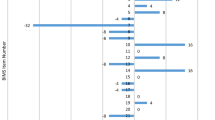Abstract
This paper presents four different contexts in which students practiced implementing business ethics. Students were required to develop Codes of Conduct/Codes of Ethics as a classroom exercise. By developing these codes, students can improve their understanding of how and why codes of conduct are developed, designed, and implemented in the workplace. Using the three-phase content analysis process (McCabe et al.: 1999, The Journal of Higher Education 70(2), 211–234), we identify a framework consisting of 10 classifications that can be used to assess learning outcomes in embedded ethics education. By analyzing the different content within each classification, instructors were able to gain a better understanding of differing application of ethical principles. This analysis indicates that there needs to be more research on codes of conduct for smaller units within an organization and more integration of work group codes of conduct into the business curriculum.
Similar content being viewed by others
References
AACSB (Association for the Advancement of Colleges and Schools of Business International): 2003, ‘Standards for Business Program Accreditation’, April, 15–16, last accessed June 20, 2003. Available at http://aacsb.edu/accreditation/brc/proposedstandards-03–10–03%20.pdf
AICPA, (American Institute of Certified Public Accountants): 2004: ‘Code of Professional Conduct’. Last accessed December 30, 2004 from http://www.aicpa.org/about/code/code_of_professional_conduct.html
AMA (American Marketing Association): 2003, ‘AMA Mission Statement’, last accessed June 20, 2003. Available at http://www.marketingpower.com/live/content.php?Item-ID=424
T. Bishop (1992) ArticleTitleIntegrating Business Ethics into an Undergraduate Curriculum Journal of Business Ethics 11 IssueIDApril 291–301 Occurrence Handle10.1007/BF00872171
A. Broussard B. Golson (2000) ArticleTitleHigh School Honor Code Curbs Cheating The Education Digest 65 IssueID6 27–30
Carroll, N.: 1993, ‘Codes Test Student’s Honor along with Knowledge’, USA Today (Arlington, VA), May 19, 8
R. Conaway T. Fernandez (2000) ArticleTitleEthical Preferences Among Business Leaders: Implication for Business Schools Business Communication Quarterly 63 IssueID1 23–38
S. Conroy T. Emerson (2004) ArticleTitleBusiness Ethics and Religion: Religiosity as a Predictor of Ethical Awareness among Students Journal of Business Ethics 50 IssueIDApril 383–393 Occurrence Handle10.1023/B:BUSI.0000025040.41263.09
E. Epstein (1998) ArticleTitleCatholic Social Teaching and Education in Business and Economics: A Non-Catholic’s Perspective Review of Business 19 IssueIDSummer 23–27
B. Farrell D. Cobbin H. Farrell (2002) ArticleTitleCan Codes of Ethics Really Produce Consistent Behaviours? Journal of Managerial Psychology 17 IssueID6 468–491 Occurrence Handle10.1108/02683940210439397
R. D. Featheringham B. P. Baker (2001) Applications in Business Communication South-Western Cincinnati
O. Fisscher A. Nijhof H. Steensma (2003) ArticleTitleDynamics in Responsible Behavior in Search of Mechanisms for Coping with Responsibility Journal of Business Ethics 44 IssueID2/3 209–223 Occurrence Handle10.1023/A:1023308018608
S. J. Harrington (1996) ArticleTitleThe Effect of Codes of Ethics and Personal Denial of Responsibility on Computer Abuse Judgments and Intentions MIS Quarterly 20 IssueID3 257–278
T. Herron D. Gilbertson (2004) ArticleTitleEthical Principles vs. Ethical Rules: The Moderating Effect of Moral Development on Audit Independence Judgements Business Ethics Quarterly 14 IssueID3 499–523
S. Isakson (2004) ArticleTitleAssessing Franciscan Values in a Business Course The AFCU Journal: A Franciscan Perspective on Higher Education 1 IssueID1 54–71
D. Jonassen L. Rohrer-Murphy (1999) ArticleTitleActivity Theory as a Framework for Designing Constructivist Learning Environments Educational Technology, Research and Development 47 IssueID1 61–70
L. A. Kidwell (2001) ArticleTitleStudent Honor Codes as a Tool for Teaching Professional Ethics Journal of Business Ethics 29 45–49 Occurrence Handle10.1023/A:1006442925586
P. Lewis (1985) ArticleTitleDefining “Business Ethics”: Like Nailing Jello to a Wall Journal of Business Ethics 4 IssueIDJuly 377–383
C. Malinowski K. Berger (1996) ArticleTitleUndergraduate Student Attitudes about Hypothetical Marketing Dilemmas Journal of Business Ethics 15 IssueIDMay 525–535 Occurrence Handle10.1007/BF00381928
D. L. McCabe L. Trevino K. D. Butterfield (1999) ArticleTitleAcademic Integrity in Honor Code and Non-Honor Code Environments: A Qualitative Investigation The Journal of Higher Education 70 IssueID2 211–234
McDonald, C.: 2004, ‘Guidance for Writing a Code of Ethics,’ http://www.ethicsweb.ca/codes/coe3
S. N. McDonnell (1998) ArticleTitleLiving Up to a Code of Ethics: There is Always Room for Improvement Vital Speeches of the Day 65 IssueID8 249–251
M. Neimark (1995) ArticleTitleThe Selling of Ethics: The Ethics of Business Meets the Business of Ethics Accounting, Auditing, and Accountability Journal 8 IssueID3 81–95
E. O’Boyle L. Dawson SuffixJr. (1992) ArticleTitleThe American Marketing Association Code of Ethics: Instruction for Marketers Journal of Business Ethics 11 IssueIDDecember 921–934 Occurrence Handle10.1007/BF00871958
D. Owens (1998) ArticleTitleFrom the Business Ethics course to the Sustainable Curriculum Journal of Business Ethics 17 IssueIDNovember 1765–1777 Occurrence Handle10.1023/A:1006000409461
H. J. Park (1998) ArticleTitleCan Business Ethics Be Taught?: A New Model of Business Ethics Education Journal of Business Ethics 17 IssueIDJuly 965–977 Occurrence Handle10.1023/A:1006050811971
S. Peppas B. Diskin (2001) ArticleTitleCollege Courses in Ethics: Do They Really Make a Difference? The International Journal of Educational Management 15 IssueID6/7 347–353 Occurrence Handle10.1108/09513540110407947
E. Pierucci (1997) ArticleTitleEnhancing the Catholic Character of an Undergraduate Business Law Course Review of Business 19 IssueIDFall 22–27
B. Peterson (1996) ArticleTitleEthics Revisited Marketing Research 8 IssueID4 47–48
A. N. RedEye (2003) Faking the Grade; Cheating Goes High-Tech, Puts Schools to the Test Chicago Tribune Chicago, Ill
R. Shannon B. Berl (1997) ArticleTitleAre We Teaching Ethics in Marketing?: A Survey of Students’ Attitudes and Perceptions Journal of Business Ethics 16 IssueIDJuly 1059–1075 Occurrence Handle10.1023/A:1017922005651
A. Singhapakdi J. Marta K. Rallapalli C. P. Rao (2000) ArticleTitleToward an Understanding of Religiousness and Marketing Ethics: An Empirical Study Journal of Business Ethics 27 IssueIDOctober 305–320 Occurrence Handle10.1023/A:1006342224035
C. Smith (2001) ArticleTitleEthical Guidelines for Market Practice: A Reply to Gaski and Some Observations on the Role of Normative Marketing Ethics Journal of Business Ethics 32 IssueIDJuly 3–19 Occurrence Handle10.1023/A:1010685524206
J. Solberg K. Strong C. McGuire SuffixJr. (1995) ArticleTitleLiving (Not Learning) Ethics Journal of Business Ethics 14 IssueIDJanuary 71–82 Occurrence Handle10.1007/BF00873738
K. Yuthas J. Dillard R. Rogers (2004) ArticleTitleBeyond Agency and Structure: Triple-Loop Learning Journal of Business Ethics 51 IssueIDMay 1–14 Occurrence Handle10.1023/B:BUSI.0000033616.14852.82
S. Vitell K. Rallapalli A. Singhapakdi (1993) ArticleTitleMarketing Norms: The Influence of Personal Moral Philosophies and Organizational Ethical Culture Academy of Marketing Science Journal 21 IssueIDFall 331–338
Author information
Authors and Affiliations
Corresponding author
Rights and permissions
About this article
Cite this article
Buff, C.L., Yonkers, V. Using Student Generated Codes of Conduct in the Classroom to Reinforce Business Ethics Education. J Bus Ethics 61, 101–110 (2005). https://doi.org/10.1007/s10551-005-0273-6
Issue Date:
DOI: https://doi.org/10.1007/s10551-005-0273-6



